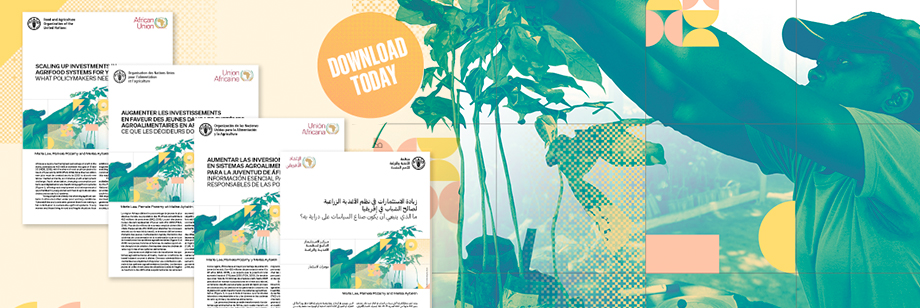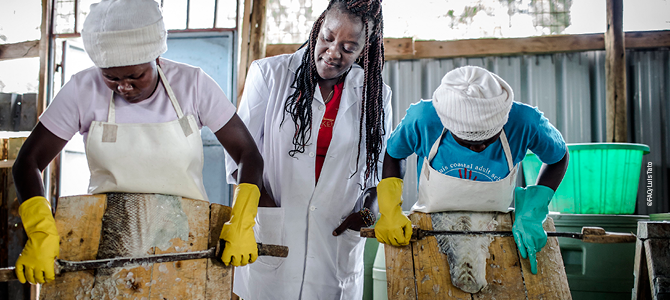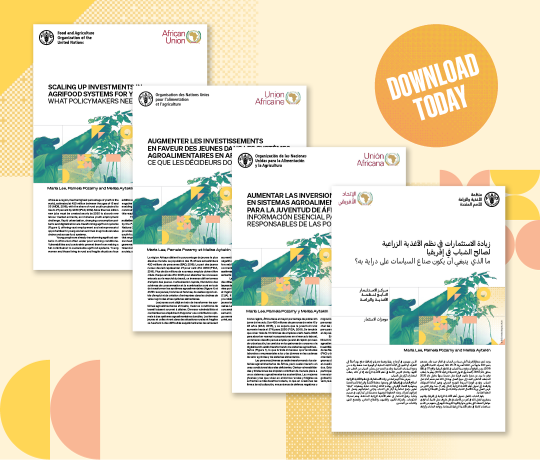Unlocking Africa's Youth Potential in Agrifood Systems: Investment Brief Offers Insights

August 12 was International Youth day. Africa's youth population is the world's largest. Creating over 10 million decent jobs annually by 2035 is crucial. Agricultural supply chains hold promise for youth, yet challenges persist. A joint brief by FAO and AUC outlines investment approaches and principle to empower youth in agrifood systems.
Agricultural supply chains and food systems offer vast employment and entrepreneurial opportunities for young women and men. But while young people are already transforming agrifood systems in Africa – building on opportunities and bringing in new ideas, innovative solutions, products and services – they often work in low paid, precarious and unsafe jobs.
This joint investment brief from the Food and Agriculture Organization of the United Nations (FAO) and the African Union Commission (AUC) titled Scaling up investments in agrifood systems for youth in Africa, what policymakers need to know looks at how to accelerate and scale-up investments for and by youth.

The brief gives an overview of the newly published Investment Guidelines for Youth in Agrifood Systems in Africa developed by FAO and AUC. It includes guidance and “how to” steps to develop youth-focused and youth-sensitive investment programmes that engage youth as partners.
“We want policymakers to know that through these technical guidelines there is a useful and timely tool at their countries’ disposal so they can create environments and incentives favourable to youth-sensitive investment,” said Abebe Haile-Gabriel, FAO Assistant Director-General and Regional Representative for Africa speaking at the launch of the guidelines back in June 2022.
“The political commitment is there,” said Dr Janet Edeme, Head of Rural Development Division, Department of Agriculture, Rural Development, Blue Economy and Sustainable Environment, AUC.
“In addition to contributing to the achievement of youth-related targets in the Malabo Declaration endorsed by the AUC Summit in 2014, youth-focused investments and enabling policies can help young people overcome the obstacles preventing them from fully contributing to sustainable agrifood systems. Agriculture needs to be more attractive and economically viable for young people,” she added.
FAO Investment Centre Director Mohamed Manssouri echoed that by saying “it’s not only about more jobs for young people, but better jobs and youth-led businesses.”
“The onus is on us globally to accelerate the transition to greener, more resilient and more inclusive agrifood systems, and investing in youth, including in new opportunities in digitalization, agrologistics, food distribution, and climate-smart innovations, is key to that transition,” he said.
In action
The investment guidelines are organized around four main steps for investing in youth: engaging youth in the investment programme cycle; undertaking assessments during pre-design with a youth lens; designing youth-inclusive investment programmes; and conducting participatory implementation, monitoring and evaluation, capitalizing on and sharing lessons learned.
To operationalize the guidelines, the first step is to make them widely accessible. The AUC, governments, financial and development partners, the private sector and youth all have a role in sharing these guidelines – from webinars to videos to podcasts – to raise awareness and get the message out.
It is also important to build national and local stakeholder capacity on applying the guidelines. Multistakeholder dialogue and workshops that include young people are crucial for identifying how best to apply the guidelines. These fora can also serve as practical entry points to apply the guidelines during the design, implementation or review of an investment programme, ensuring youth needs and aspirations are met.
Governments also play a pivotal role in providing opportunities to engage youth as agents for change at every stage of the investment programme, while encouraging collaboration across ministries and with development and financial partners.
Investments for and by youth in agrifood systems in Africa are urgently needed. The guidelines heed this call by promoting their full engagement in the process. Young people are key actors in contributing to greater economic prosperity, stronger social capital and more sustainable agrifood systems.
This publication is available in English, Spanish, French and Arabic.


